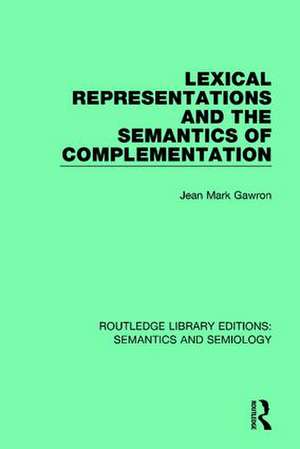Lexical Representations and the Semantics of Complementation: Routledge Library Editions: Semantics and Semiology
Autor Jean Mark Gawronen Limba Engleză Paperback – 27 feb 2018
| Toate formatele și edițiile | Preț | Express |
|---|---|---|
| Paperback (1) | 198.19 lei 6-8 săpt. | |
| Taylor & Francis – 27 feb 2018 | 198.19 lei 6-8 săpt. | |
| Hardback (1) | 473.94 lei 6-8 săpt. | |
| Taylor & Francis – 4 oct 2016 | 473.94 lei 6-8 săpt. |
Preț: 198.19 lei
Nou
Puncte Express: 297
Preț estimativ în valută:
37.92€ • 40.55$ • 31.62£
37.92€ • 40.55$ • 31.62£
Carte tipărită la comandă
Livrare economică 17 aprilie-01 mai
Preluare comenzi: 021 569.72.76
Specificații
ISBN-13: 9781138694743
ISBN-10: 1138694746
Pagini: 472
Ilustrații: Illustrations, black and white
Dimensiuni: 156 x 234 x 24 mm
Greutate: 0.45 kg
Ediția:1
Editura: Taylor & Francis
Colecția Routledge
Seria Routledge Library Editions: Semantics and Semiology
Locul publicării:Oxford, United Kingdom
ISBN-10: 1138694746
Pagini: 472
Ilustrații: Illustrations, black and white
Dimensiuni: 156 x 234 x 24 mm
Greutate: 0.45 kg
Ediția:1
Editura: Taylor & Francis
Colecția Routledge
Seria Routledge Library Editions: Semantics and Semiology
Locul publicării:Oxford, United Kingdom
Cuprins
1. Prepositions and Verbs; 1.1 Introduction: Methodological Preliminaries 1.1.1 Motivations for Lexical Representations 1.1.2 Lexical Semantics and the Grammar 1.2 Terminological Preliminaries 1.3 Prepositions 1.4 The Problem for Logical Form: A First Solution 1.5 Some more Preposition Meanings 1.5.1 Individuating Preposition Meanings 1.6 A Proposal Concerning English Prepositions 1.7 Lexical Representations 1.8 The Logic of Frames 1.9 Core Participant and Adjuncts 1.9.1 Preposition Meanings 1.9.2 Direct Inheritance 1.9.3 The Right Theory 1.10 Revising Semantic Compatibility 1.11 Conclusion; 2. Figure and Ground Scenes; 2.1 Introduction 2.2 A Commercial Event 2.2.1 Selling and Possessive TO 2.2.2 Buying and Source 2.3 A New Definition of Semantic Compatibility 2.3.1 Commercial Events Revisited 2.4 Lexical Representations and Knowledge Representations 2.4.1 The New Proposal 2.4.2 Some Technical Revisions and Stipulations 2.5 The Preposition for and More Commercial Events 2.5.1 Buy, Sell and Pay 2.5.2 A Note on Polysemy 2.5.3 Ex-spending the Ontology 2.6 Other Motivations for Figure and Ground 2.7 Conclusion; 3. Where are the Case Theories of Yesteryear?; 3.1 Why Case Grammar? 3.2 Some Facts about the Semantical of Grammatical Relations 3.2.1 Active and Causal Subjects 3.2.2 Change and Effective Instruments 3.2.3 Experience and Causers 3.2.4 Summary 3.3 The Hierarchy and its Function 3.4 Some Issues in the Semantics of Nuclear Terms 3.4.1 Cross-Categorical Claims 3.4.2 Optionality and Instruments 3.4.3 Kajita’s Quandary and Subcategorization 3.4.4 A Note on the Figure, and POS_TRANS; The Semantics of Valence’ 3.5.1 A Hierarchy for Verbs 3.5.2 Subcategorisation; 4. Valence Alterations; 4.1 Optional Advancement 4.1.1 Instrument Promotion 4.1.2 Dative Movement 4.2 Advancement Involving Change 4.2.1 Goal Promotion 4.2.1.1 The Patient Valence 4.2.1.2 The Goal Valaence 4.2.2 Other Rules 4.2.2.1 Container Promotion 4.2.2.2 Symmetric Predicates 4.2.2.3 Origin Promotion 4.4 Conclusion: Semantic Options versus Lexical Rule; 5. Predicaton, Control and Lexical Rules Revisited; 5.1 Infinitival Complements 5.2 Predicative PP’s 5.3 Frame Representation of Predictive PP’s
Descriere
First published in 1983, this book attempts to lay the groundwork for a general approach to lexical semantics. The first chapter proposes a framework of lexical description which is then expanded upon in chapter two. A theory of the semantics of nuclear terms along with a proposed implementation is presented in chapter three. The fourth chapter argues that a number of regular, semantically governed valence alternations could be captured in frame representations that give rise to various kinds of realisation options. The final chapter examines the interaction of these phenomena with a general account of prediction or control and with the general framework of lexical representation.














